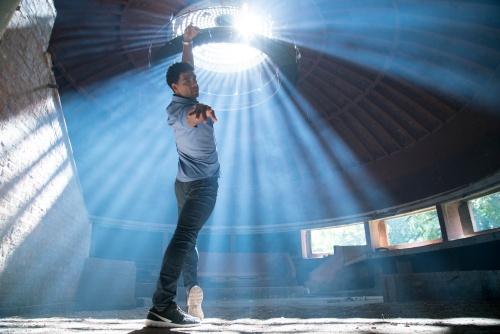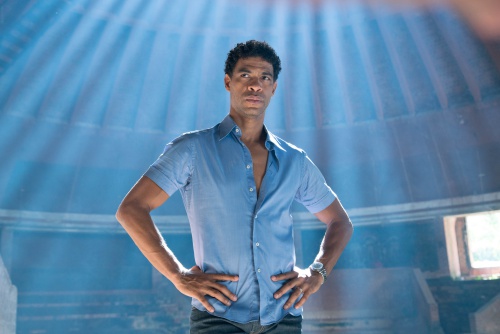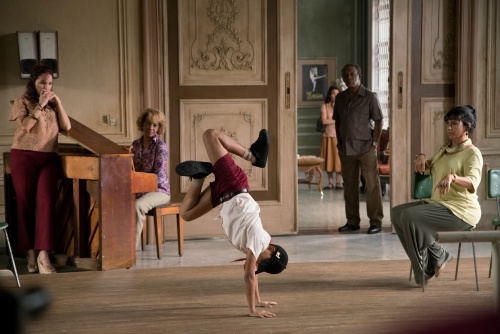|
 |
|
|
 |
 |
“Yuli” is a riveting bio-pic, inspired by acclaimed classical ballet dancer Carlos Acosta’s equally riveting autobiography “No Way Home, A Cuban Dancer’s Story” (now republished as “Yuli.”), which I read during my trip to Cuba last year. The award-winning movie, in its New York premiere, was the closing-night film of the 20th Havana Film Festival New York’s 12-day celebration of Latin American cinema (April 5-16). It is directed by Madrid-born Iciar Bollaín and written by her husband, British-born Paul Laverty, with brilliant choreography by Maria Rovira, who is also from Spain. It mirrors Acosta’s memoir from a Havana childhood of poverty all the way to fame, with honesty and poignancy, but without all the sex bits detailed in the book. More than a few audience members were in tears by the end. The movie opens with the contemporary Acosta, now 45, standing on the stage of a magnificent Havana theater, where his fine company, Acosta Danza, is rehearsing scenes from his storied life. Acosta founded the company in 2016, shortly after his retirement from The Royal Ballet (1998-2015), where he rose to become the first black principal dancer. (Acosta Danza made its New York premiere last April, which I reviewed at www.exploredance.com/article.htm?id=4914&s=author&sid=7554). Acosta is reliving his past via stunning dance sequences in which he either performs or observes, interspersed with scenes from his life in flashbacks, and includes actual footage of his celebrated performances. It is a masterful cinematic achievement. Flashbacks include his reluctant audition at the state-funded Ballet Nacional de Cuba and numerous rebellions as a child, skillfully portrayed by Edilson Manuel Olbera Núñez in his first film role, with strength of character, dance moves and defiant attitudes. Dragged there by his determined father, Pedro (renowned actor and dancer Santiago Alonso), Acosta dreams about becoming a soccer player like Pelé. (He is also a breakdance wiz in his neighborhood). However, his father, who gave him the nickname Yuli after the son of the warrior Ogun, has other plans for him. Pedro, a practitioner of Santería, a popular Afro-Cuban religion, reminds him throughout his life that Yuli must live up to his namesake. Returning to the present, Acosta and his doppelganger, the incredible Mario Sergio Elias from Acosta Danza, are locked into a powerful intimate duet of tenderness and longing for a life not of Acosta’s making, two curly headed performers dancing with one heartbeat. A harrowing scene occurs after his father gets out of prison and beats the young boy with a leather belt to within an inch of his life because he was playing hooky from school. Reenacted in dance as well, Acosta plays his father, the sharp thwack of his belt on the floor resonating on either side of the dodging and ducking Elias. Asked about his father in the Q&A that followed the screening, Acosta replied that his father had a strict upbringing imposed on him as well. “Whatever he did, however he did it, came from a source of love,” he said. “He was born in 1918, a very hard society for him. Whatever I am, he was the one who pursued that career with me.” The movie also traces the family’s history, which includes his mother’s health problems, his sister’s schizophrenia, which leads to her suicide, and racism. Pedro is black, descended from African slaves, which impacted his life. Acosta and one of his two sisters are dark-skinned (in reality, Acosta is the youngest of 11 children), and he has to deal with discrimination as well, including from his mother’s white side of the family. After many trials and tribulations, Acosta, now portrayed as a young man by the remarkable dancer Keyvin Martínez, leaves to work in Italy and London, but misses Cuba terribly. In fact, in the book and in the movie, he is a whiner and complainer. Acosta returns to Havana to heal from a broken ankle, his career in doubt, but content to lead a “normal” life to the consternation of his father and the disbelief of his friends, one of whom tells him that he is the only one who wants to stay. Acosta eventually gets his act together and, no spoiler, goes on to have a remarkable career. Proceeds from the April 16th evening’s events, with optional gala, benefited The International Performing Arts Foundation, a charitable organization that collaborates closely with Acosta, Acosta Danza and the Carlos Acosta International Dance Foundation. TIPAF provides funds to Acosta Danza so that they can provide an all-expenses-paid three-year Dancers-in-Residence Program to a select group of talented, emerging dancers of limited means from around the globe, at the Acosta Danza Academy, which opened in Havana in September 2017. “I’ve been very fortunate in my life … living in a country that allowed people from underprivileged backgrounds to study a very expensive art for free,” said Acosta before the screening. “There are a lot of talented people in the world who weren’t as lucky as I was.” He cited one success story of a youngster who came from an orphanage in the Dominican Republic and is now performing the lead toreador in “Don Quixote.” “I am really passionate about this because it’s giving back all the chances that we had,” he continued. “If we don’t extend a hand, we are in danger of losing our own humanity. It’s not about us. It’s about those who benefit from what we do.”
 Carlos Acosta in "Yuli". Photo © & courtesy of Denise Guerra |
|
 Carlos Acosta in "Yuli". Photo © & courtesy of Denise Guerra |
|
 A scene from "Yuli". Photo © & courtesy of Denise Guerra |
|
 A scene from "Yuli". Photo © & courtesy of Denise Guerra |
|
|
|





